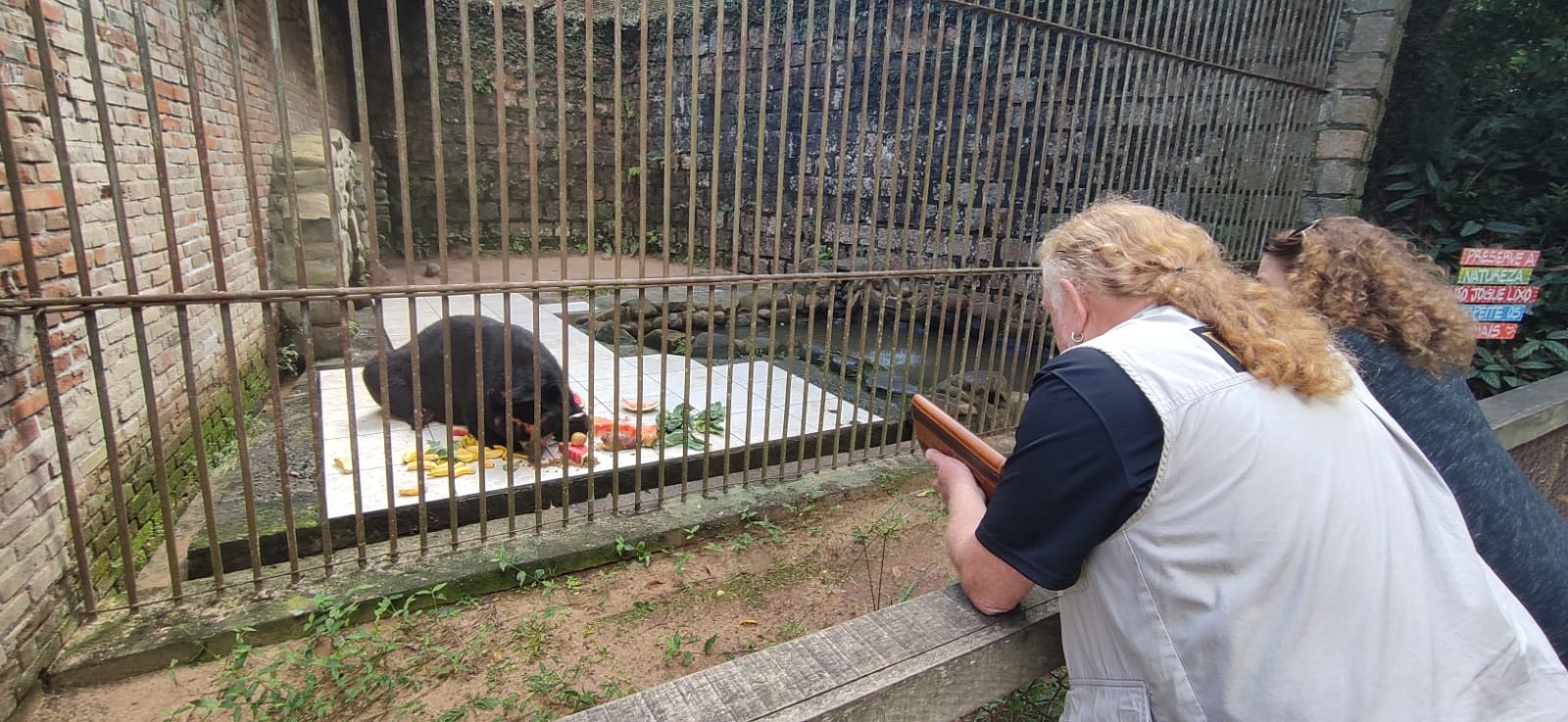Zoo Inspector Training in Brazil drives Animal Welfare Reform
Internationally active animal welfare charity Wild Welfare was back in Brazil recently to introduce a new batch of potential animal welfare auditors to the process of conducting animal welfare audits. An animal welfare audit is when a whole facility is inspected against a set of standards which is designed to measure whether a captive wild animal facility, such as a zoo, aquarium, or sanctuary, is able to deliver good quality care for the animals. At the invitation of the President of Association of Zoos and Aquariums Brazil (AZAB), Mara Marques, and the Association’s Welfare Committee, Wild Welfare’s Field Director Dave Morgan, and Margaret Whittaker from Creative Animal Behaviour Solutions travelled to the country in April this year. After two years of virtual training, this was the first on-site, in-person training course for the team and it was wonderful to be back in South America.
Two full days of welfare auditor training took place with 39 participants from 12 AZAB facilities in attendance. Topics discussed included: an introduction to animal welfare concepts, methods commonly used to assess animal welfare, essential traits of a good auditor, objectives of an audit, scenario-based, practical exercises, and the opportunity to use the AZAB Welfare Audit framework to practice with the host zoo’s inhabitants. The workshop was presented at Guarulhos Zoo, outside of Sao Paulo.
Driving forward positive changes for animals in captive facilities requires strategic thinking about needed modifications to facilities and animal care practices. Auditing a facility can highlight opportunities for animal welfare improvements and help set priorities for effective use of resources. With an ever growing and well-trained team of auditors, facilitated by Wild Welfare, AZAB is able to assess the welfare status of more zoos and aquariums and reach more animals, affecting positive changes and welfare improvements.
The team were delighted to interact with some very passionate trainee auditors who were full of fresh ideas and progressive plans for the future. One of these individuals came from the first zoo which Wild Welfare ever audited. This was a wonderful incidence of the charity’s work coming full circle and a chance to highlight the impact that the charity has had over the past decade as it celebrates its 10th anniversary.
Recommendations resulting from an audit can drive positive outcomes for animals under human care. These improvements might include a healthier diet provided in a manner to encourage natural feeding behaviours, changes to enclosures which offer the animals more choice, comfort and control within their environments, and improved management of health care for the animals. The overall aim for all animals under human care is to ensure that they can thrive.
Indicators of these long-term, sustainable changes achieved through positive collaborations such as the partnership between AZAB and Wild Welfare, could be seen during the visit. Dave was most gratified to note that several specific individual animal recommendations from prior audits in previous years had been carried out, and some bears and a chimpanzee had been relocated to facilities with better social and behavioural opportunities for them.
“The core to long term change and sustainability and the provision of positive animal welfare lies in co-operation and collaboration between those facilities holding captive wild animals. In previous audits, some zoos were asked to acknowledge the fact that they might not be able to maintain certain individual animals under conditions of optimal care and welfare. The audits teams at the time recommended that these individual animals be relocated to other facilities that could provide this care. We saw several incidences where these recommendations had been carried out and the animals concerned were in happier environments.”
Following the auditor training workshop, the Wild Welfare team joined two AZAB auditors in visiting three AZAB member facilities to carry out audits for welfare certification. The facilities included one aquarium and two zoos in southern Brazil. A certification compliance visit was also conducted at an additional previously-certified facility, where welfare concerns had since been reported. This particular visit being part of AZAB’ s internal due-diligence practice within its Welfare Certification process and maintenance.
Wild Welfare has worked alongside AZAB for a number of years, and has conducted training workshops and certification audits with the goal of developing a self-sustainable, positive animal welfare programme for the Association and its members.
Overall feedback from the audit training was very positive with delegates referring to it as an inspirational experience. More training is planned with AZAB for later in the year and will include additional and expanded auditor training and more on-site audits will be conducted in tandem with AZAB auditors. A total of 30 AZAB member zoos and aquariums have now been audited by a combination of Wild Welfare and AZAB teams. That is 30 zoos or aquariums where a welfare audit of the whole facility has been conducted and animal welfare improvements have been identified. This means that the recommendations made during these inspections have improved the lives of thousands of animals. Also, the skills learned by the AZAB auditors can continue to make a difference and create the sustainable change in how facilities care for animals. AZAB has a total of 56 member facilities and the intent is to have audited at least 45 by the end of 2023.
~ENDS~
Notes to Editors
For more information or interview requests please contact Wild Welfare on communications@wildwelfare.org
Wild Welfare is a global organisation committed to improving animal welfare for captive wild animals. By uniting the world’s leading zoos, zoo associations and animal welfare organisations, we build trusting partnerships that help provide long-term solutions to critical wild animal welfare issues.
Our vision is to end the suffering of captive wild animals around the world and ensure full and sustainable protection is given to all animals in human care. Find out more at wildwelfare.org. Registered charity in England (no.1165941).





